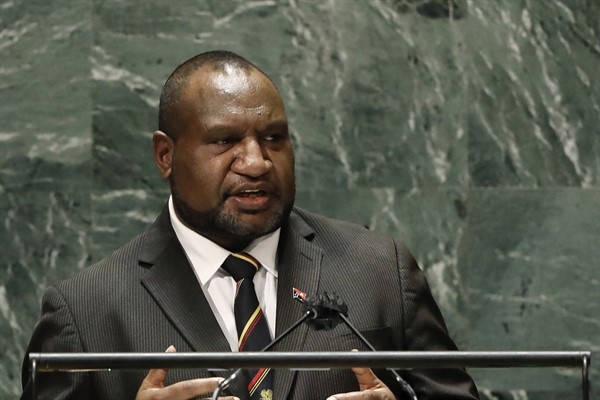O’Neill, who heads the People’s National Congress, has also marshaled an experienced Cabinet-in-waiting, which includes Marape’s former running mate and coalition partner Davis Steven. He has promised to create 500,000 jobs, inject funding into small and medium-sized enterprises and agricultural cooperatives, reinvigorate national infrastructure—including widening access to power, water and sanitation—and spend 1 billion kina, or around $280 million, on health facilities. Marape, on the other hand, is emphasizing his efforts to expand PNG’s base of micro and small and medium-sized enterprises by holistically growing agriculture and tourism businesses through the provision of key infrastructure. For now, Marape is considered the favorite, but he may emerge significantly weakened following the horse trading among coalition partners and political favors that will likely ensue once the count is in. That said, voter fraud is set to play an outsized role in this election. Reports of vote buying and bribery of election officials abound, and there are concerns that funding-related problems in updating the electoral roll may deny eligible voters the chance to cast ballots, while providing bad actors the opportunity to enfranchise the deceased. Last weekend, Marape was also forced to distance himself from an incident involving a suitcase containing $644,000 in cash found on a charter plane that landed in his native Hela province. His son, who was on the plane, was taken into custody. Several changes to key election dates in the run-up to polling, including the timing of the single day allocated for voting in Port Moresby, the capital, have done little to bolster the public mood. As such, the Supreme Court may have something to say about the validity of this election once the dust has settled. In the meantime, a 10,000-strong security presence is overseeing the proceedings, raising fears that the army and police may be used to intimidate voters and candidates. There are particular concerns about the intimidation of women voters, who for the first time this year will be able to use separate voting booths, with the hope that this will encourage female participation, which is typically low. In fact, PNG currently has one of the lowest rates of female political representation in the world and not a single woman in parliament, a dismal status quo that looks set to continue beyond this month’s elections. Just 167 out of the 3,625 candidates standing for office are women, and the shelving of plans to reserve five parliamentary places for women at this year’s polls means that only a handful of female candidates have a chance of winning one of the 118 seats up for grabs. In terms of global geopolitics, whoever assumes the office of prime minister will find himself at the center of a tussle for influence between the U.S. and Australia on one side, and China on the other. In April, concerns over Chinese influence in the Pacific Islands region reached fever pitch upon the signing of a security pact between Beijing and the Solomon Islands, which included provisions for China to make ship visits to Honiara. Although many analysts are skeptical that China has the capability to project naval power deep into the Pacific, that has not stopped the Australian media from whipping up a firestorm around the idea of a Chinese naval base potentially being built in PNG. In broad strokes, most observers expect that a Marape victory would result in PNG moving closer to Australia, while O’Neill, who favors “looking north,” will seek warmer ties with Beijing. But whatever the outcome, Chinese Foreign Minister Wang Yi’s recent whistle-stop tour of eight Pacific Island nations, combined with this week’s announcement that Washington will be tripling aid to the strategically located region, suggests that PNG is in line to benefit from great power efforts to cement local influence. Whether Papuans themselves see any of those benefits is another story. At the very least, high participation in the ongoing election makes clear that voters still want their voices to be heard in PNG’s vibrant yet flawed democracy.Marape will be judged on whether he is making progress on his 2019 pledge to “Take back PNG” from foreign influences and ensure the population benefits from the country’s vast mineral wealth.
David Green is a London-based journalist and editor. He has extensive experience reporting from China and elsewhere in the Asia-Pacific on technological, economic and political developments in the region.

